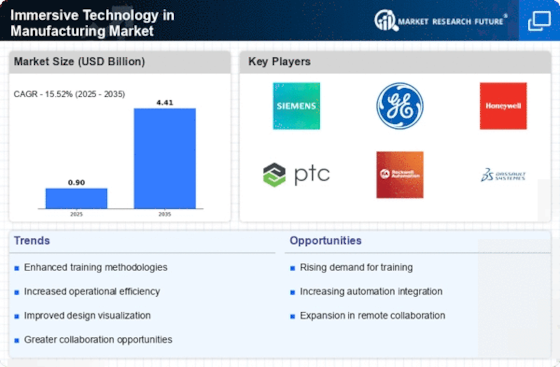Top Industry Leaders in the Immersive Technology in Manufacturing Market

Immersive Technology Transforms Manufacturing: A Deep Dive into the Competitive Landscape
The once-stoic manufacturing industry is experiencing a radical metamorphosis. At the heart of this transformation lies immersive technology, encompassing virtual reality (VR), augmented reality (AR), and mixed reality (MR). These technologies are reshaping every aspect of the manufacturing process, from design and training to production and maintenance, unlocking unprecedented levels of efficiency, accuracy, and safety. Navigating the dynamic and intricate landscape of immersive technology in the manufacturing market requires a keen understanding of the key players, their strategies, and the evolving trends shaping the future.
Leading the Charge: Key Players in the Immersive Arena:
- Acer Inc.
- Atheer, Inc.
- AVEVA Group PLC
- Barco NV
- Blippar Ltd.
- Carl Zeiss AG
- CM Labs Simulations Inc.
- EON Reality, Inc.
- FAAC Incorporated
- Google, LLC
- HCL Technologies Limited
- Honeywell International, Inc.
- HTC Corporation
- Immersive Media Company
- Immersive Technologies Pty Limited
- Lockheed Martin Corporation
- Magic Leap, Inc.
- NCTech Limited
- Oculus (Facebook Technologies, LLC.)
- Samsung Group
- Sony Corporation
- Unity Software Inc.
- Varjo Technologies Oy
- VI-grade GmbH
- Zeality Inc
Strategic Maneuvers for Market Dominance:
-
Industry-Specific Solutions: Players are moving beyond generic platforms, focusing on developing software and hardware tailored to specific manufacturing needs. For example, VR simulations for welding training or AR overlays for assembly guidance cater to distinct industry challenges.
-
Ecosystem Building: Collaboration is key. Leading players are actively building ecosystems of hardware manufacturers, software developers, and system integrators to offer end-to-end solutions encompassing hardware, software, and content creation.
-
Subscription-Based Models: Shifting from upfront licensing fees to subscription models with recurring revenue streams fosters long-term customer relationships and encourages continuous technology updates.
Factors Anchoring Market Share:
-
Technology Breadth: Offering a wider range of immersive technologies like VR, AR, and MR, along with supporting software and content creation capabilities, caters to diverse needs and strengthens market presence.
-
Ease of Integration: Seamless integration with existing manufacturing software and hardware systems simplifies adoption and minimizes disruption to current workflows.
-
Cost-Effectiveness: Demonstrating a tangible return on investment through increased efficiency, reduced errors, and improved safety is crucial for convincing manufacturers to embrace immersive technology.
Emerging Waves: New Players and Future Horizons:
-
Haptic Technology: Advancements in haptic feedback simulate real-world textures and physical interactions within virtual environments, enhancing training realism and precision in VR experiences.
-
Artificial Intelligence (AI): Integrating AI with immersive technology enables real-time process optimization, predictive maintenance, and even self-learning virtual assistants, automating tasks and augmenting human capabilities.
-
5G Connectivity: High-speed 5G networks will empower real-time data transfer and collaboration between remotely located teams, further blurring the lines between physical and virtual workspaces.
Investment Currents Flowing Towards:
-
VR Training Solutions: The rising demand for immersive training experiences across various manufacturing disciplines is attracting significant investment in VR content creation tools and platform development.
-
AR-Assisted Assembly and Maintenance: Investors are backing companies developing AR overlays that guide assembly processes, diagnose equipment issues, and provide remote expert assistance, boosting productivity and reducing downtime.
-
Industry-Specific Platforms: Specialized software platforms tailored to specific manufacturing segments, like automotive or aerospace, are garnering investment as they address unique challenges and offer tangible benefits.
The competitive landscape of immersive technology in the manufacturing market is fluid and dynamic. Players who can navigate the currents by offering industry-specific solutions, fostering collaboration, and demonstrating ROI will likely emerge as leaders. As immersive technology becomes increasingly integrated into the fabric of manufacturing, its transformative power will not only shape efficiency and productivity but also redefine the way we design, build, and maintain the products that define our world.
Latest Company Updates:
-
November 30, 2023: Siemens partners with NVIDIA to develop an Industrial Metaverse platform for collaborative virtual factory environments. -
December 19, 2023: PTC announces the launch of Vuforia Spatial Mapping, enabling real-time 3D mapping of factory floors for enhanced AR experiences. -
December 5, 2023: Ford Motor Company announces a $300 million investment in immersive technologies to enhance product design, prototyping, and virtual testing, aiming for faster innovation and reduced costs.










